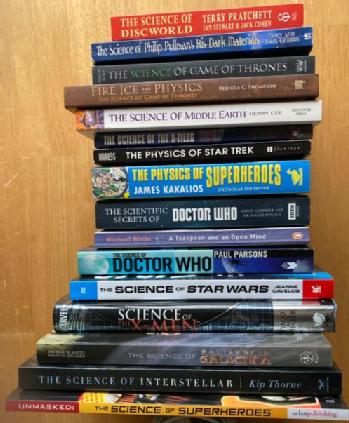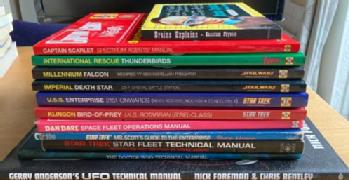Science and SF
The human imagination has always striven to explore and explain the unknown. The earliest attempts to explain the world around us generated a rich seam of traditional knowledge, often with the supernatural invoked where the limits of human experience were exceeded. As modern western science was developing and being formalised through the eighteenth and nineteenth centuries, it called for a new way to explore its limits and imagine ways to exceed them. The subset of modern fiction that probes this horizon, particularly by extrapolation from our current understanding, is known as speculative or science fiction (SF).
Science fiction is a vast genre, encompassing books, comics, film, television and radio programmes, as well as performance media and imagery, all of which can be (and is!) studied from literary, thematic, philosophical, dramatic or sociological viewpoints. For most people though, the words science fiction suggest pure entertainment, adventures in space and time and sweeping vistas of the universe around us. From childhood, we see examples of space operas on television and many blockbuster films use science fiction either for its creative freedom, or as a vehicle to deliver spectacle in support of their plots. There is, of course, nothing wrong with this! Science fiction is primarily a genre we engage with because we enjoy the stories and characters, and for many, suspension of disbelief requires that the science fiction world and its rules is accepted uncritically.
 Nonetheless, for some researchers (and many fans!) there is an urge to explore further, to look at the underlying science and to rationalise the technologies and scenarios which have been created. This interest is witnessed by dozens of “Science of…” books, written for a general audience and for source material as varied as Star Trek, Star Wars, Doctor Who, Middle Earth, X-Files, Superheroes, Harry Potter, Interstellar and Game of Thrones. These books are themselves outnumbered by magazine articles, technical manuals, spin off media and fan-generated internet resources which explore the same topics, often from an "in-universe" perspective in which aspects of science in the real world are reported as historical or background information for characters in the extrapolated science fiction universe. There is also an active area of academic research which explores not just the science in SF but also the relationship between science and SF.
Nonetheless, for some researchers (and many fans!) there is an urge to explore further, to look at the underlying science and to rationalise the technologies and scenarios which have been created. This interest is witnessed by dozens of “Science of…” books, written for a general audience and for source material as varied as Star Trek, Star Wars, Doctor Who, Middle Earth, X-Files, Superheroes, Harry Potter, Interstellar and Game of Thrones. These books are themselves outnumbered by magazine articles, technical manuals, spin off media and fan-generated internet resources which explore the same topics, often from an "in-universe" perspective in which aspects of science in the real world are reported as historical or background information for characters in the extrapolated science fiction universe. There is also an active area of academic research which explores not just the science in SF but also the relationship between science and SF.
(Image: examples of "Science of..." books on science fiction and fantasy topics. Below: examples of fictional "technical manuals")
As a research astrophysicist, and a science fiction fan, I find myself fascinated by this relationship. In particular, I’m intrigued by two aspects of it: the ways in which science fiction may act as a tool for science communication, and the possibility that SF may serve as a historical record of the public understanding of science. Of course, neither of these areas is without its problems.
 The “Science of…” books I mentioned above are perhaps the most overt examples of science communication which arise from SF. These explicitly set out to explain the elements of scientific truth that underlie the fiction, aiming to educate a particular fan base. In fact, in some of these books the actual connection to the source material can best be described as tenuous, with the nominal topic acting as little more than a hook for a popular science text. There are even more striking examples of this - notably "Brains Explains... Quantum Physics" (Octopus Books 2015), the pages of which are illustrated with imagery from the television series Thunderbirds but in the text of which, the only acknowledgement of the series is the use of machine or character names in a handful of widely-scattered physics examples.
The “Science of…” books I mentioned above are perhaps the most overt examples of science communication which arise from SF. These explicitly set out to explain the elements of scientific truth that underlie the fiction, aiming to educate a particular fan base. In fact, in some of these books the actual connection to the source material can best be described as tenuous, with the nominal topic acting as little more than a hook for a popular science text. There are even more striking examples of this - notably "Brains Explains... Quantum Physics" (Octopus Books 2015), the pages of which are illustrated with imagery from the television series Thunderbirds but in the text of which, the only acknowledgement of the series is the use of machine or character names in a handful of widely-scattered physics examples.
As well as supporting popular science, physics teaching can also use fiction as an engagement tool, with science fiction used in the teaching of Habitability in the Universe at Warwick and to provide scenarios for physics examples and exam questions. Clearly, without such overt and guided interpretation, there is always a risk that science fiction may mislead, with the boundaries between current knowledge and speculative extrapolation unclear to the audience. Nonetheless, even without pedagogic texts, can science fiction have an impact on public engagement with science?
Of course! Science fiction is differentiated from fantasy through its root in contemporary science (although the boundary is admittedly a blurry one). In order to build a new world in the minds of the audience, the existing science understanding must act as a foundation, whether this is communicated explicitly or whether knowledge of it is implicitly assumed. Black holes, relativistic effects, computer artificial intelligence development, exoplanets and rocket-powered space travel are all staples of science fiction which exist and share actual characteristics with their representations on screen or in text. Thus good science fiction can foster curiosity about the world around us, can reinforce existing scientific knowledge or can communicate complex concepts in a fictionalised setting. Perhaps unsurprisingly then, many scientists also have an interest in science fiction.
There have been a large number of studies on this topic (e.g. work by Dr Lindy Orthia), and the cause and effect between an interest in science and an interest in science fiction can be hard to distinguish: do science fiction fans like science because they’ve been encouraged to look at it differently, or are scientists interested in science fiction because it speaks to their existing curiosity about the world? In truth, probably both are true. A recent survey of Warwick’s astronomers suggests that only about a fifth (7/36) consider themselves neither influenced by or a fan of science fiction. (More on this survey next time!)
As I mentioned, SF can also provide a valuable historical record not of how science is being developed by academics (recorded in the academic literature) or of how it is being taught (in textbooks, which often lag the scientific frontiers) , but rather of how both the science and scientists are being understood by members of the general public, and interpreted in popular culture. Just to take a simple example, the decline in fictional narratives involving Venus (common in the 1950s and before in examples such as Dan Dare: Pilot of the Future) can be traced back to the improvement in our understanding of that planet as a result of American and Russian probe missions. Similarly, the rising (although still very low) number of female scientists portrayed in SF, and the decreasing appearances of lab-coated old men in the role, provides a record of the slowly changing stereotype of what it means to be a scientist, with implications for both how science is represented and for broader recruitment into STEM subjects.
Of course, the history of science communication isn’t necessarily straightforward to interpret. For example, I recently looked at the representations (both scientific and conceptual) of Earth’s Moon over almost sixty years of broadcasts of Doctor Who. To give one example, the 1971 serial “The Silurians” introduced its audiences to the then-current scientific theory that the Moon had been captured into Earth orbit after formation elsewhere, providing an example of scientific education in the series. However, as a result of this, later stories involving the titular Silurians broadcast in 2010 and 2012 repeated the Moon-capture hypothesis as in-universe “fact”, despite it having been disfavoured scientifically in the “real” world since the late 1970s.
As these examples show, the relationship between science and science fiction is complex and deeply-rooted. Perhaps most importantly, the two intersect at an emotional level and in the interests of those who engage with them. For those of us who work in investigating the Universe we live in, pushing the boundaries of our understanding ever further outwards, science fiction provides the opportunity to peek beyond those boundaries, to experiment with ideas of what may be as well as learn what is.
"Science and SF", Elizabeth Stanway, Cosmic Stories blog, 7th March 2021.
